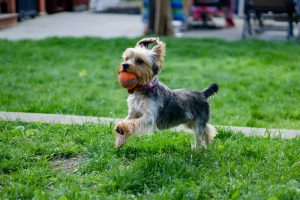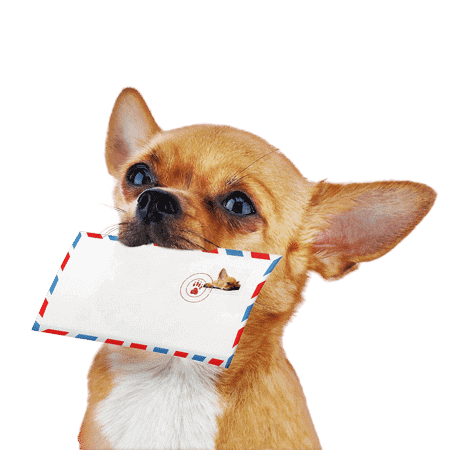What is a puppy school? What is it for and how to choose it?
The Puppy School®: a registered trademark
First of all, it is helpful to specify that the term “puppy school®” is a registered trademark by its creator, ethologist Joseph Ortega, to protect his concept and not distort his working methods.
A dog training centre or a professional dog educator cannot legally offer this service to their members/clients by naming it “Puppy School®” without meeting the conditions set forth by the author of the method. Among these conditions, at least one instructor/educator of the structure offering a “puppy school” must be trained in the technique designed by its creator.
That said, many structures have been inspired by it and now offer it to their members/clients without officially having the approval of the inventor of the method. Thus, to designate all these structures, we will rather speak of “puppy recess” than of “puppy school” in the rest of this article.
What is Puppy Play, and what is it for?
Puppy playtime is a service offered by dog training clubs or professional dog trainers in which the young animal is brought into contact with other dogs of all sizes, breeds, ages and sexes.
Under playful aspects where the puppy will have the opportunity to play and interact with these other dogs, the goal is to teach the puppy intra-specific communication, i.e. communication with his fellow dogs, within his species. Through contact with other dogs, the puppy will learn to behave well, communicate his peaceful intentions, avoid conflict or convey his uncomfortable emotional state. In other words, the puppy recreation must allow the puppy to continue to learn the codes specific to his species (his mother has initiated this learning) and to learn to be able to stop one of his “indelicate” behaviours, under penalty of being “reframed” by one of his congeners.
Attending a puppy kennel is therefore entirely in line with the socialization process of your puppy towards his fellow dogs. This will allow him not to be afraid of other dogs in his future life and to know how to “behave” in the presence of one of his congeners by not being aggressive or “stalker” against him.
Puppy playtime is a highly enriching experience for your puppy. as long as you choose the suitable facility. Otherwise, attending a puppy playground could be counterproductive or even devastating to your pet’s future behaviour.
How do you choose a suitable puppy playground?
A supervised puppy playtime
Puppy playtime is beneficial for the puppy. When it is properly organized, to do so, the puppies must evolve in the presence of at least one adult control dog (and, ideally, of several dogs depending on the number of puppies to be supervised) AND of a competent dog trainer to supervise the sessions.
The regulator dog is a well-trained and well-balanced adult dog whose “job” will teach intra-specific communication to the puppies. Thus, this regulator dog intervenes to put a firm but peaceful stop to all the puppies’ “rudeness” towards him, to the rise in excitement, to the brutality, to the overly solid bites or even to the endless play sequences… He thus allows to calm and discipline the youngest ones and restore order within the group of dogs by teaching the puppies that limits should not be crossed. It also helps to prevent some puppies, more potent than others, from taking over and bullying the weaker ones and, once they are adults, becoming intolerant to any form of frustration. On the other hand, it also allows the shyest puppies to be harassed by others, at the risk of making them fearful of their congeners as adults or even anxious.
It is essential to accustom the puppy to various stimuli during its first months of life. Still, it is equally important that these experiences positively have the desired effect on adult behaviour.
The dog trainer must be familiar with the dog’s intraspecific codes and must know how to differentiate between normal and abnormal canine behaviour to intervene if he detects one during the session.
To sum up, you will have understood that the puppy playtime must undoubtedly be a playful moment for the puppy but must not be just a “kindergarten yard” without supervision where all the kids are running around without any adult, dog or trainer, ever intervening to calm or discipline them.
A playground that accepts very young puppies
A puppy can be welcomed in a puppy kennel from 2 months and, generally, until six months. But, in practice, some structures refuse to embrace puppies before their anti-rabies vaccination is done, which can’t be done before the animal is three months old. This is a pity because the best period to socialize a puppy is between 1 and 3 months of age, a period when the puppy is curious and when it is essential to get him used to various social stimuli so that he will consider them as “banal” when he becomes an adult. After three months of age, the puppy maybe a little more reluctant to meet people.
Preferably, then, you should prefer structures that welcome puppies from their two months of age.
A recreation that teaches you the basics of your puppy’s education
It would help if you also chose facilities that would accompany you in your puppy’s education in addition to offering this “recreational” time to your puppy. A part of the session should ideally be devoted to teaching primary indications and deciphering your dog’s behaviour to give you the keys to understand him better and better interact with your dog to establish the most beautiful relationship. Yes, at the Puppy School®, not only the puppy has to learn new things.





